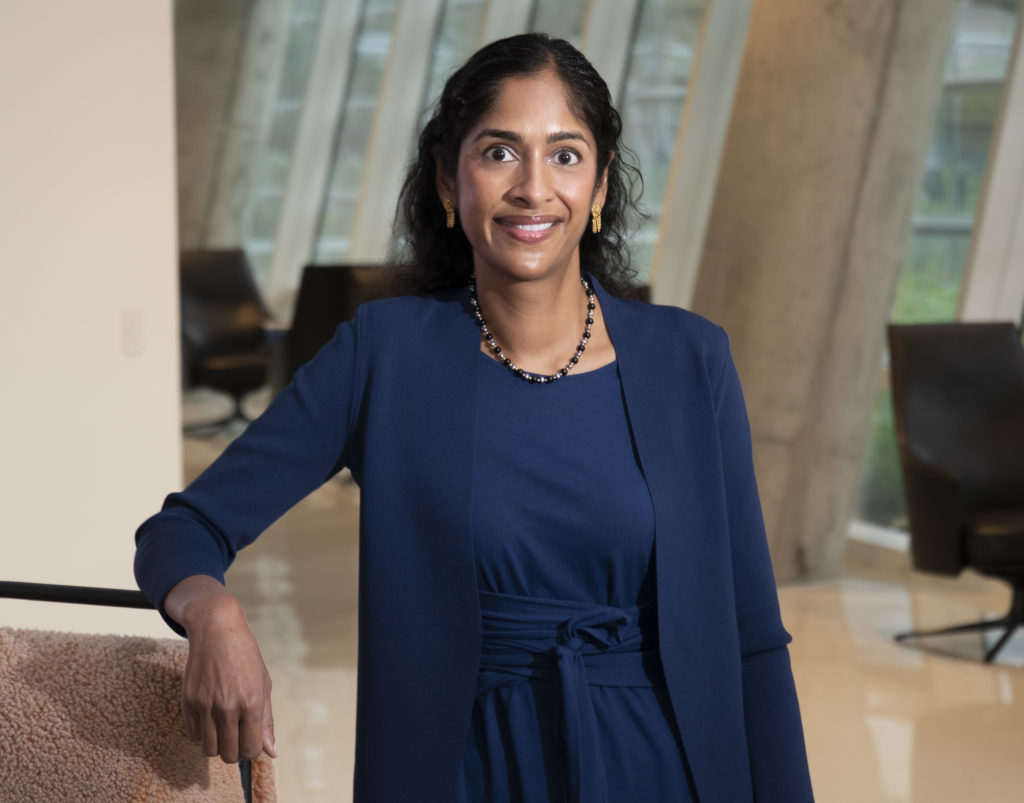
American Airlines hired Priya Aiyar as its general counsel in August 2019 when the Fort Worth-based company was scoring near-record revenues and profits and looking to expand its routes domestically and internationally.
Blue skies and great visibility were ahead, though airlines know turbulence can suddenly surface from fluctuating fuel prices and union spats to civil unrest in some destinations and even volcanos erupting and spewing ash into normal flight patterns.
A global pandemic, however, that essentially ended nearly all air travel domestically and internationally was on no one’s radar.
“Crazy legal issues pop up every day in the airline industry, but nothing like this,” Aiyar told The Texas Lawbook. “It was hugely challenging because there was so much uncertainty.”
Between March and June 2020, Aiyar and her team of 32 attorneys in American’s legal department worked 12 or even 15-hour days on a plethora of coronavirus-related issues, including:
- Providing refunds to travelers whose trips were canceled;
- Developing and implementing new screening procedures designed to meet standards set by the Centers for Disease Control;
- Identifying and complying with ever-evolving health standards – such as mandatory mask wearing and social distancing – issued by every city, state and country in which American operates;
- Designing a voluntary leave program for employees;
- Navigating a 30% reduction in American’s workforce;
- Securing government grants and government and private loans of more than $25 billion.
These Covid-19-related actions were in addition to the non-pandemic legal issues that American’s legal department handles, including securing regulatory approval for partnerships and/or code-sharing agreements with Alaska Airlines, JetBlue and Qatar Airlines.
Aiyar and her team also notched major litigation victories in 2020 in a consumer class action lawsuit regarding trip insurance, two class actions brought under ERISA and an employment discrimination case.
And Aiyar oversaw successful settlement negotiations with Boeing to compensate American for hundreds of millions of dollars in damages related to the grounding of the 737 Max.
PREMIUM SUBSCRIBERS: FIND A SPECIAL Q&A WITH PRIYA AIYAR BY CLICKING HERE.
“I’m also proud of the work the legal team did both in working with our government affairs team to support passage of Covid relief legislation and then in working with our finance team to negotiate and secure grants and loans and ensure compliance with all their requirements and terms,” she said. “That support allowed us to keep our team members employed and our planes flying during this crisis.”
The Association of Corporate Counsel’s DFW Chapter and The Texas Lawbook have named Priya Aiyar as a finalist for the 2020 DFW Outstanding Corporate Counsel Award for General Counsel of the Year for a Large Legal Department.
The finalists will be honored and winners announced at the annual DFW Outstanding Corporate Counsel Awards ceremony June 3 at the George Bush Institute.
“Although this year has been one of the most challenging in American’s 94-year history, under Priya’s leadership, the legal department rose to the challenge and played a critical role in successfully navigating the company through this crisis,” said Stacey Cho Hernandez, a partner at Carter Arnett and president of the Dallas Asian American Bar Association.
“Given the challenges that 2020 presented, Priya and her legal team have made extraordinary achievements,” said Hernandez, who nominated Aiyar for the award. “Even more impressively, they did so despite a reduction in force and while many members of American’s team were personally affected by the Covid-19 pandemic.”
While tackling all of these crisis-related issues, Aiyar also has reinvigorated American’s pro bono outreach efforts and its diversity and inclusion initiatives.
“Priya is the consummate team player who has helped drive terrific outcomes for American since arriving,” said Latham & Watkins partner Tony Richmond, who worked on several of those capital market and funding projects for American last year.

“This has been particularly important since the Covid pandemic basically shut down air travel,” Richmond said. “That was a crisis of the sort the industry has never seen before – and this industry has seen a lot of crises. She was a very steady hand as the company worked its way through a very uncertain time. She is a cool customer.”
Stephen Johnson, executive vice president of corporate affairs at American Airlines, said he conducted an extensive national search when hiring the next general counsel. Despite having no airline industry experience, Aiyar was by far the best person for the position.
“Priya has taken a super high-functioning legal department to the next level,” Johnson said. “We were so lucky to have Priya on board before the pandemic hit. She has helped guide us through the unbelievable number of legal and compliance issues that surfaced during the pandemic.
“Priya has no ceiling,” he said. “If she remains in the airline industry, the industry will experience a revolution in operations and Priya will be a key reason for that evolution. She is unlike any other lawyer who has ever worked in the airline industry.”
Aiyar was born and grew up in the San Francisco Bay area, except for a three-year stint when a young Aiyar and her family lived in Lubbock while her mother did a medical residency at Texas Tech.
Her father was a professor of statistics at San Francisco State University. Her mom was a pediatrician and worked at Kaiser. They are retired and live in the Bay Area.
Aiyar said that a “host of experiences made me who I am as a person and as a lawyer,” including growing up in the diversity of the Bay Area, learning the experiences of her family members as immigrants and living abroad.
“Certainly a lot of my life experiences have emphasized for me the role of luck and circumstance in career and life, [including] my good fortune in being born in the United States,” she said. “My dad was only able to come to this country because of the post-Sputnik panic about the U.S. falling behind in science, which led to universities opening up to more foreign grad students.
“But they’ve also emphasized the importance of making your own luck when you can by seizing opportunities that arise,” she said.

Aiyar, who had no lawyers in her family, went to Harvard University to study public policy and political philosophy. She realized by her junior year of college that “a lot of the policy issues I was most interested in were really legal issues.”
After two years studying philosophy and politics at Oxford University, Aiyar went to Yale Law School thinking she wanted to be an academic.
“After three years of school and working on the law journal, I realized that I enjoyed solving clients’ real-life problems more than I enjoyed thinking about hypothetical problems and working on law review articles that didn’t always seem relevant to how the law worked in practice,” she said.
Aiyar graduated from Yale with her law degree in 2001 and immediately clerked for Judge Merrick Garland of the U.S. Court of Appeals for the D.C. Circuit. A year later, she clerked for U.S. Supreme Court Justice Stephen Breyer.
She said both are “brilliant jurists and extraordinary mentors” who had a “great impact” on her life and career.
“Clerking for them is like becoming part of a large extended family,” she said. “Judge Garland calls his clerks’ children his ‘grandclerks.’ It’s amazing to get to work directly with lawyers of their stature fresh out of law school, and they treated their clerks as professional equals even though we obviously weren’t.
“With both of them, you would be vigorously debating an issue and then have an ‘oh my gosh’ moment where you remembered that you were arguing with an appeals court judge and Supreme Court justice,” she said.
In 2003, Aiyar joined the litigation boutique Kellogg Huber because it offered her the opportunity to “get real stand-up experience.”
“I interviewed at some larger firms where I could have focused on interesting appellate work but where it would have been hard to get any courtroom or trial experience as an associate,” she said. “At Kellogg, I had my first trial within a year of joining the firm, working with now-Justice Neil Gorsuch who was the lead partner on the case.”
Aiyar, whose practice was a mix of trial and appellate litigation and internal investigations, was named a partner at Kellogg in 2008.
In June 2009, she took a job as legal advisor to the chair of the Federal Communications Commission.
“I had always wanted to work in government, and I was inspired to try to make the jump after President Obama got elected,” she said. “I had done a lot of telecom work at Kellogg, so the FCC was a natural step. It was my first real window into how policy gets made in government, including all the sausage-making aspects.”
In July 2010, another interested opportunity arose for Aiyar – to be deputy chief counsel for the National Commission on the BP Deepwater Horizon Oil Spill, which President Obama created to investigate the disaster’s causes and to make recommendations to prevent it from happening again.
Aiyar led a small group of lawyers looking into “basically everything that happened after the explosion on the rig,” including the efforts to contain the spill, which flowed for 87 days until the well was finally capped.
“A lot of my work focused on investigating the preparedness of government agencies as well as industry,” she said. “One of our main takeaways was that deep-water drilling technology had vastly outpaced containment and response technology. The technologies used in response to the Deepwater Horizon spill were largely the same as those used in response to the Exxon Valdez spill in 1989.”
Aiyar spent two and a half years as deputy general counsel of the U.S. Department of Energy and then three and a half years at the U.S. Treasury department, where she became general counsel.
“Some of my biggest projects were defending the actions that Treasury took to stem the financial crisis, including successfully defending a lawsuit in which the shareholders of AIG sought to recover $40 billion from American taxpayers on the ground that the rescue of AIG had been illegal,” she said.
She also oversaw the successful defense against a multibillion-dollar claim brought by shareholders of Fannie Mae and Freddie Mac and the successful defense of Treasury’s decision that the Affordable Care Act makes insurance subsidies available in every state, which culminated in a Supreme Court victory in King v. Burwell.
In 2017, Aiyar joined Willkie Farr as a partner – a position she held for two years.
In summer 2019, an executive search group contacted Aiyar about the general counsel’s position at American Airlines, which came open when Paul Jones retired.
“While I enjoyed law firm practice a lot, I had been thinking about going in-house after leaving government,” she said. “I really liked getting to have a broader perspective on the enterprise and being able to provide advice that stopped problems and disputes from developing in the first place, rather than being called in after things had already gone sideways.
“I thought working at American would never be dull, and I was certainly right about that,” she said.
While Aiyar has been at American for only 21 months, she can already count some major victories for herself and her legal team.
For example, in August 2020, U.S. District judge John McBryde dismissed a lawsuit brought under the Helms-Burton Act by Robert Glen, a Cuban-born man who became a naturalized U.S. citizen who claimed the airlines “trafficked” in property confiscated from them by the Cuban regime. Glen charged that American’s website allowed travelers to book hotel rooms on properties that were taken from him and his family.
Judge McBryde ruled, however, that American “did not deprive plaintiff of the properties or the profits he might make if he owned and operated hotels on the property.” The plaintiff has appealed the decision.
Paul Yetter, a Houston litigation partner at Yetter Coleman and long-time lawyer for American Airlines, said Aiyar leads by her intellect and good judgment, not by her title.
“For someone who has been at the top in everything she’s done, she is as humble and thoughtful as it comes,” Yetter said. “She listens — really listens.”
Yetter said his firm is representing American in a major antitrust case against its top fare distributor over “issues that go to the heart of how the airline serves its customers.”
“Nothing about the case is simple, just like the air travel business itself,” he said. “And the pandemic made the industry even more complex. Yet Priya soaks up details and strategy and guides the team with a sure hand. The saying that smart people simplify things fits Priya to a tee.”
The biggest challenges Aiyar faced at American have been the Covid-19 crisis and the 30% reduction in American’s management – including the legal department – that took place last summer.
“Although the airline is smaller, the amount of legal work isn’t,” she said. “We now have a leaner legal team handling a host of novel issues related to the Covid crisis as well as their usual plate of work. And, of course, our lawyers and staff are handling this increased workload while dealing with all of the pandemic-related issues that the whole country is dealing with – personal and family health concerns, kids in Zoom school, etc.”
Aiyar said she first heard about the coronavirus in January 2020. At first, it impacted flights to China and then to Italy. By March, it was taking its toll on domestic travel.
“When the CDC said there needed to be a three-week shutdown, we actually thought it would be three weeks,” she said.
Aiyar and the legal and finance teams at American engineered $4.1 billion in grants and $1.7 billion in low-interest loans under the CARES Act in April 2020. In June, the company raised another $2 billion through securities offerings and $500 million more in November. And American received about $3 billion more in the December relief legislation passed by Congress.
In all, American completed more than $25 billion in financing transactions, including a $7.5 billion loan from the U.S. Treasury that was secured by American’s loyalty program assets.
“My best days have been the days in March and in December when we were able to announce to our front-line team members that they would all be staying on or returning to the payroll thanks to the passage of Covid-19 relief legislation and our work to secure the available government grants and loans,” she said. “In December, our payroll, HR, labor relations and legal teams worked around the clock to recall our team members and get them paychecks before Christmas, even though the legislation only passed on Dec. 21 and wasn’t signed by the president until Dec. 27.”
Aiyar has also taken steps to reinvigorate American’s pro bono program.
During the pandemic, she and her team launched a new pro bono partnership with New Friends New Life, a nonprofit that help women and girls in the Dallas area whose lives have been impacted by human trafficking.
“Victims of trafficking often have arrests and criminal offenses in their records that can prevent them from obtaining employment, housing and social services,” she said. “We partnered with Jones Day to represent 19 women in this situation in getting criminal offenses expunged from their records.”
Lindsay A. Hedrick, a partner at Jones Day in Dallas who just became the chief labor and employment counsel at Honeywell, said numerous lawyers and staff at American and Jones Day are working together on the initiative.
“There are plans to possibly expand the pro bono legal services offered to women in the New Friends New Life program beyond expunction of criminal records,” Hendrick said. “Priya leads by example. Despite being a busy general counsel, Priya made time last fall to participate herself in the expunction pro bono project along with her legal department colleagues.
“Priya helped remove a prostitution charge from the criminal record of a victim of human trafficking,” she said. “Priya brings to her pro bono involvement the high-level creative thinking and energy that are the hallmarks of her work as American Airlines’ general counsel.”
